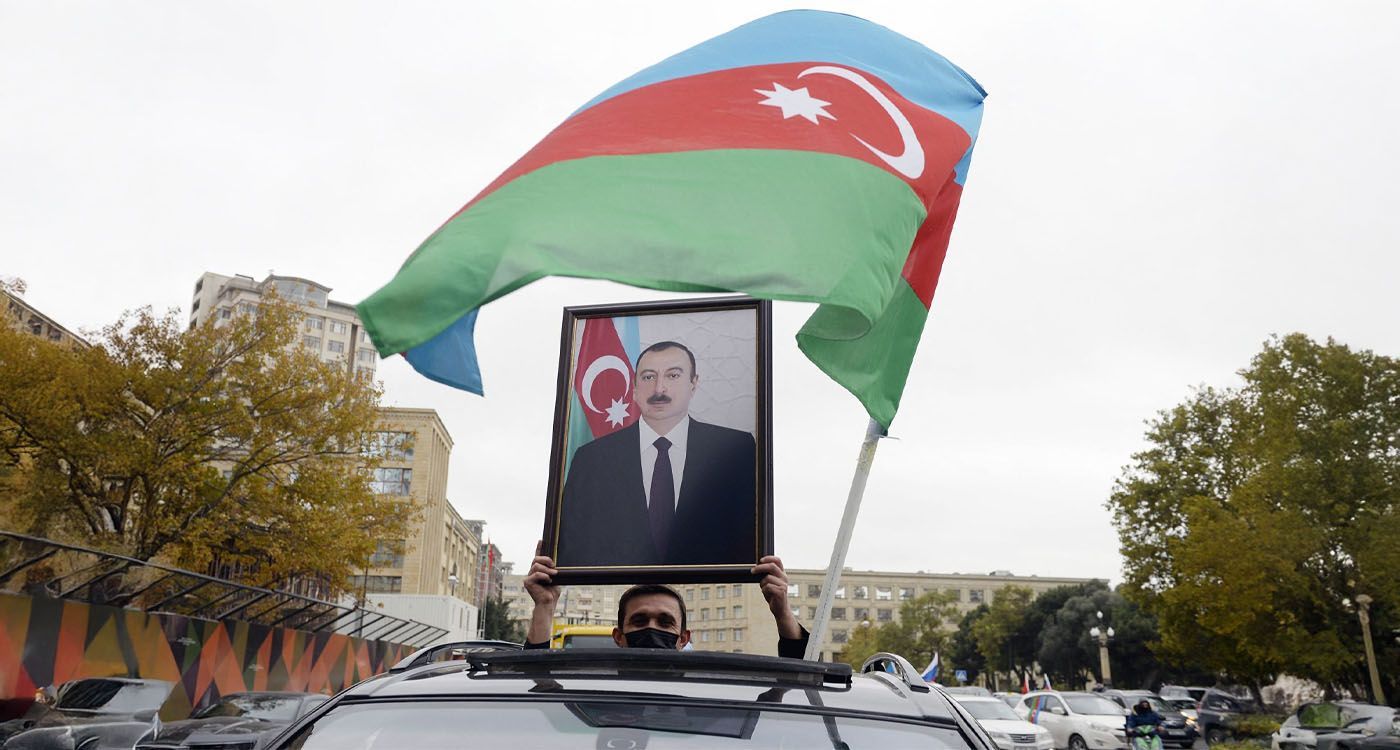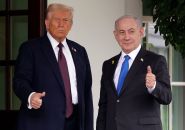- Home
- Middle East
- Azerbaijan: The Triumph of Pragmatism over Religious Identity

A man holds a flag and a photo of Azerbaijani President Ilham Aliyev during celebrations of the country's victory over Armenia after a weeks-long war over the disputed region of Nagorno-Karabakh, in Baku, on November 20, 2020. ©Tofik Babayev/AFP
In the heart of the Caucasus, Azerbaijan stands out for its unconventional geopolitical alignments. Though predominantly Shia in religious composition, this secular post-Soviet republic has positioned itself as one of Israel’s closest allies and a strategic partner to the West, all while maintaining a strained relationship with neighboring Iran.
This unlikely alignment is no coincidence. It reflects a deliberate strategy rooted in national security priorities, regional power balances and a diplomacy shaped by opportunity.
A Shia State Defined by Its Secular Outlook
Unlike Iran’s theocratic system, Azerbaijan adopted a secular model from the moment it gained independence in 1991, setting itself apart from the revolutionary Shia Islamism of the Iranian mullahs’ regime.
According to the Middle East Institute, this fundamental divergence has fostered deep mutual distrust. The divide goes beyond ideology, feeding a broader geopolitical and identity-driven rivalry, as the two states embody fundamentally incompatible visions.
Tensions between Tehran and Baku run deep. Iran views Azerbaijan as a threat to its territorial integrity, largely due to the roughly 15 million Azeris living within its borders.
According to the American think tank Atlantic Council, this perception has fostered ethnic paranoia among Iranian leaders. Tehran fears that Azerbaijan could inspire unrest among its Azeri population.
Iran’s hostility is not only rooted in fears of Azeri separatism. Azerbaijan is also a close ally of two of Iran’s key strategic rivals: Israel and Turkey.
This alliance deeply frustrates Tehran, which views Baku as a forward base for its adversaries along its northern border. According to the Middle East Institute, Iran believes that Baku has granted Israel significant operational freedom to conduct actions within Iranian territory.
To counter Baku, Iran has relied on two main levers: supporting Armenia and backing radical Shia armed groups, according to the Atlantic Council. The Housseiniyyoun group, founded by Qassem Soleimani, is accused of orchestrating several attacks targeting Azerbaijani officials.
The think tank also reports that Baku has thwarted multiple assassination attempts, including a 2023 plot against the Israeli embassy.
Tensions between Iran and Azerbaijan have escalated through successive Nagorno-Karabakh wars involving Armenia. Since the 1990s, Tehran has backed Armenia in an effort to curb the growing Turkish-Israeli influence along its northern border. This stance has deeply frustrated Baku, particularly during the second Nagorno-Karabakh war in 2020, when Iran was accused of allowing weapons to transit through its territory to Armenia.
A Key Strategic Alliance with Israel
Confronted with these challenges, Azerbaijan turned to Israel, becoming its main oil supplier and a major purchaser of Israeli arms. According to the Atlantic Council, Israeli weapons accounted for 69% of Azerbaijan’s arms imports between 2016 and 2021.
This alliance goes far beyond trade. It holds critical geostrategic significance: Forbes reports that the Mossad maintains a significant presence in Azerbaijan, with Baku’s approval.
As early as 2012, officials in the Obama administration estimated that Israel could use Azerbaijani territory to strike Iran’s nuclear facilities.
The importance of this relationship was summed up by President Ilham Aliyev, “Our relations with Israel are like an iceberg, with nine-tenths hidden beneath the surface.”
Energy at the Core of Diplomacy
In the energy sector, Azerbaijan has emerged as a strategic partner for the European Union, particularly in the wake of the war in Ukraine. In 2023, the country exported 11.8 billion cubic meters of gas to the EU, according to the Heinrich Böll Foundation.
The EU increasingly relies on Baku to lessen its dependence on Russian gas, despite ongoing concerns over human rights.
Indeed, the European Parliament called for the suspension of the energy memorandum with Azerbaijan, citing its troubling political record, which includes persistent repression of the opposition, restrictions on press freedom, a compromised judiciary and systematic violations of fundamental rights.
A Growing Force in the Middle East
Baku has also expanded its diplomatic presence in the Middle East, particularly in Syria. Following the fall of the Assad regime, Azerbaijan quickly established official ties with the new Syrian leadership.
Baku is viewed as a potential mediator between Israel and Damascus. The Stimson Center notes that Syrian authorities see Azerbaijan as a valuable player and intermediary in relations with Israel.
Proof of this strategy came last Thursday, when Israeli and Syrian ministers met in Baku to discuss the security situation in southern Syria. This unprecedented meeting was arranged by Azerbaijan, acting as a neutral mediator.
Azerbaijan’s role grew even more prominent after the Iran-Israel conflict in July 2025, when Iranian media accused it of supplying intelligence support to Israel.
Azerbaijanis’ Take on the Matter
There is no official data or public polling on how the Azerbaijani population views Israel. The regime of Ilham Aliyev tightly controls the media and restricts critical voices, especially on strategic matters.
Nonetheless, the near absence of hostile protests or visible opposition points to a level of tolerance, if not implicit approval, of this alliance.
This support largely stems from the pivotal role Israel played in the conflict against Armenia. According to the Center for Strategic and International Studies (CSIS), Baku regards Tel Aviv as a key supplier of drones, ballistic missiles and intelligence, which played a significant part in the military victories of 2020 and 2023.
For a vast majority of the population, national sovereignty and reclaiming the Nagorno-Karabakh territories take priority over sectarian considerations.
Azerbaijan embodies a rare form of strategic independence in the Muslim world. Despite its Shia majority, it sets itself apart from Iran through its secular system, pro-Western foreign policy and strong ties with Israel.
In a fragmented geopolitical environment, Baku has deliberately pursued a strategy of diversifying its alliances and embracing pragmatic realism, even if it means navigating a paradox that unsettles many.
Read more




Comments